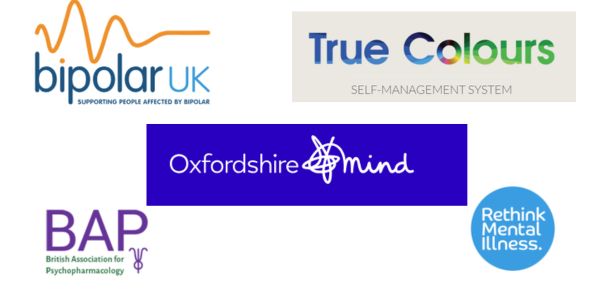What is Bipolar disorder?
Bipolar disorder is the experience of episodes of high and sometimes irritable mood (hypomania/mania) together with episodes of low mood (depression). These mood episodes are associated with other symptoms such as:
- sleep disturbances (too much or too little)
- impulsivity (eg. inappropriately spending too much money)
- difficulty concentrating and being organised
- a change in the speed of thought and speech (too fast or too slow)
- and overly negative or positive thinking.
Symptoms can affect the ability to think and function to the extent that it can be very difficult to carry out normal daily activities. Also, someone’s behaviour can be so uncharacteristic that it is noticed by others.
Mood disturbance in bipolar disorder often starts in adolescence or early adult life, and commonly the first episode is depression. Many people live with bipolar disorder for many years before they seek help.

Our research using new monitoring techniques has shown that for many people with bipolar disorder the key feature of their illness is chronic mood instability. We hope that a better understanding of the role of mood instability in bipolar disorder will eventually lead to the development of new and better treatments in the future.
Working with the Oxford Health Biomedical Research Centre (OH BRC)
The Bipolar Disorder Research Clinic and the OH BRC have a strong track record of developing and testing new treatments and procedures, having together conducted over 100 clinical trials. We are also part of a large international collaboration with the leading research institutes in psychiatry across the world. Our strategy is to bring the best science to mental health.
The OH BRC transforms our discovery science into new treatments and diagnostic tools, delivering precision care that is strongly informed by patient involvement, ethical and economic considerations.
Research opportunities
Our research using new monitoring techniques such as True Colours shows that many people with bipolar disorder have chronic mood instability, even when they are well. We hope that a better understanding of the role of mood instability in bipolar disorder will lead to the development of new and better treatments.
We do different sorts of research including:
- using a variety of technologies to monitor your mood and related activity
- completing questionnaires and being interviewed by a researcher
- donating a blood sample
- having a brain scan
- taking part in computer based tasks
- taking part in trials testing medication or psychological treatment.
Open Clinical Trials
ASCEND
There are currently limited treatment options available for people experiencing depressive symptoms. Very little is known about using antidepressants in patients living with bipolar. Antidepressants can be very effective in people with depression and can also be prescribed by a GP. In this study, we will use a combination of an antidepressant (sertraline) and an antipsychotic drug (aripriprazole) and compare this with a drug called quetiapine. Quetiapine is a common treatment for people experiencing depression in bipolar. All three drugs are already used in the NHS, but we want to find out if using a sertraline/aripiprazole combination will be beneficial in reducing depressive symptoms in people with bipolar.
CRiB2
Many people who have been given a diagnosis of bipolar disorder experience difficulties with their memory, concentration or their ability to make decisions and solve problems. These problems can affect people’s quality of life and may make some everyday tasks or working difficult. Cognitive remediation is a psychological therapy which has been shown to help people improve their thinking skills.
In Crib2, we are using a computerised version of cognitive remediation, called CIRCUITS, which focuses on linking the training of thinking skills to many real-world situations and problems. Therapy sessions will be held two to three times per week (for approximately one hour) with the help of a therapist, and participants will be also encouraged to practice CIRCUITS in their own time.
250 people, aged 18-65 years, are recruited to take part in the CRiB2 study. They are randomly allocated to two groups; half of the participants are offered cognitive remediation therapy for 12 weeks, as well as continuing their normal treatment, and another half are asked to only continue their treatment as usual.
All participants will be asked to attend three assessment sessions (before the intervention starts; after it has finished; and three months later), where they will complete a series of measures and questionnaires.
For more information about our current studies, please contact:
Tel: 01865 902135
Email: [email protected]
Further information
Bipolar Disorder -Guidelines for treatment
National Institute for Health and Care Excellence (NICE)
British Association for Psychopharmacology
Support and information for patients and carers


